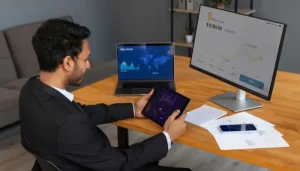Introduction
Cryptocurrency has sparked immense interest worldwide, and Pakistan is no exception. However, buying crypto in Pakistan comes with challenges due to regulatory restrictions and limited banking support. This comprehensive guide explains how to buy crypto in Pakistan, offering a clear, step-by-step process to help beginners and seasoned traders navigate the market safely. By using trusted platforms like Fillyx, which supports local payment methods and prioritizes security.
Pakistanis can confidently enter the crypto space. Despite the State Bank of Pakistan (SBP) not recognizing cryptocurrencies as legal tender, individuals can still trade legally through peer-to-peer (P2P) platforms. This article covers the legal landscape, payment options, security tips, and best practices to ensure a seamless experience while focusing on how to buy crypto in Pakistan.
The Regulatory Landscape for Crypto in Pakistan
Understanding the legal environment is crucial when learning how to buy crypto in Pakistan. In 2018, the SBP issued a circular prohibiting banks and financial institutions from facilitating crypto transactions, citing risks like volatility and potential misuse. However, this does not make owning or trading cryptocurrencies illegal for individuals, creating a legal gray area.
When choosing a platform, prioritize those with robust security features, such as two-factor authentication (2FA) and cold storage. Staying informed about regulatory updates and selecting reputable platforms are key to safely navigating how to buy crypto in Pakistan in this evolving landscape.
Step-by-Step Guide to Buying Crypto
Learning how to buy crypto in Pakistan starts with selecting a trusted platform. Here’s a detailed guide to purchasing cryptocurrency:
Choose a Platform: Opt for a reputable exchange with strong security and local payment support. Fillyx is a user-friendly option tailored for Pakistani users, offering an intuitive interface and secure transactions.
Create an Account: Sign up by providing your email and a strong password. Complete the Know Your Customer (KYC) verification by submitting your CNIC or passport to comply with anti-money laundering (AML) regulations.
Deposit Funds: Use local payment methods like JazzCash, Easypaisa, or bank transfers to deposit Pakistani Rupees (PKR). In P2P trading, select a verified seller, transfer funds, and confirm the payment. The platform’s escrow system ensures the crypto is released only after payment confirmation.
Buy Cryptocurrency: Navigate to the trading section, select your desired asset (e.g., Bitcoin or Ethereum), enter the amount in PKR, and confirm the purchase. The crypto will be credited to your platform wallet.
Secure Your Assets: Transfer your crypto to a private wallet, such as a hardware device (e.g., Ledger), for enhanced security.
Legal and Regulatory Considerations
Navigating the legal landscape is a key part of understanding how to buy crypto in Pakistan. While the SBP’s 2018 circular restricts banks from handling crypto transactions, individuals can still trade through P2P platforms or international exchanges. The Securities and Exchange Commission of Pakistan (SECP) has introduced some oversight, requiring crypto businesses to register and comply with AML and counter-terrorism financing (CTF) regulations.
However, the absence of a comprehensive framework means users must exercise caution. To stay safe, choose platforms with KYC verification and avoid unregulated exchanges. Be aware that crypto profits may be subject to capital gains tax under Federal Board of Revenue (FBR) rules, so maintain transaction records for compliance.
Choosing the Right Payment Methods
One of the biggest challenges in How to Buy Cryptocurrency in Pakistan is finding suitable payment methods due to banking restrictions. Since local banks do not support direct crypto purchases, P2P trading is the most common approach. Popular payment options include:
Mobile Payment Services: JazzCash and Easypaisa are widely used for quick, secure transfers to P2P sellers.
Bank Transfers: Cost-effective for larger transactions, though some banks may flag crypto-related transfers.
Digital Wallets: Platforms like NayaPay or international options like PayPal (where available) offer flexibility.
Cash Transactions: Riskier and less recommended, as they lack escrow protection.
When depositing funds, verify the seller’s reputation and ensure the platform uses an escrow system to secure transactions. Compare fees and processing times to choose the most cost-effective method.
Security Tips for Safe Crypto Trading
Security is paramount when learning how buying crypto, given the prevalence of scams in unregulated markets. Follow these tips to protect your investments:
Use Trusted Platforms: Select exchanges with 2FA, encryption, and cold storage to safeguard funds.
Enable 2FA: Activate two-factor authentication on your account to prevent unauthorized access.
Secure Storage: After purchasing, transfer crypto to a hardware wallet (e.g., Trezor) for offline storage, reducing hacking risks.
Avoid Scams: Be cautious of phishing websites, fake sellers, and pump-and-dump schemes. Only trade through verified platforms with escrow systems.
Protect Private Keys: Never share your wallet’s private keys or recovery phrases, as they grant full access to your funds.
Regularly monitor your accounts and stay informed about common scams. By prioritizing security, you can confidently navigate buying crypto and protect your digital assets from potential threats in the market.
Benefits and Risks of Crypto Investment
Cryptocurrencies like Bitcoin also offer potential high returns, though they come with risks. The primary risks include:
Volatility: Crypto prices can fluctuate dramatically, leading to potential losses.
Scams: Unregulated markets are prone to fraud, such as fake sellers or phishing attacks.
Regulatory Uncertainty: Future regulations could impact crypto trading or impose taxes.
To mitigate risks, diversify your portfolio across assets like Bitcoin, Ethereum, and stablecoins like USDT. Start with small investments and avoid putting in more than you can afford to lose.
The Future of Crypto in Pakistan
The future of cryptocurrency in Pakistan looks promising despite current challenges. Growing adoption, driven by remittances and investment interest, suggests potential for regulatory evolution. As more Pakistanis explore how to buy bicoin, platforms with local support and strong security will play a pivotal role. Staying informed about market trends and regulatory updates will help investors capitalize on opportunities while minimizing risks. With the right approach, crypto can be a valuable addition to your financial strategy.
Conclusion
Ready to start your crypto journey? Understanding how to buy crypto in Pakistan is the first step to unlocking the potential of digital assets. Sign up on a trusted platform like Fillyx today, follow the steps outlined, and invest wisely with proper security measures. Begin with a small investment, stay informed, and join the growing community of Pakistani crypto enthusiasts. Take action now and explore the world of cryptocurrency!






